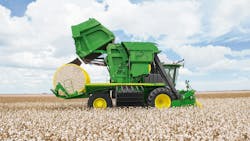When to Use Duals Versus Super Singles
Soil moisture level is a big factor in determining whether duals or super singles are the best choice for combines.
Dave Paulk, manager of field technical services for BKT USA Inc., says there are definite drawbacks to using the wrong setup.
He originally spoke about the issue in the AG Tire Talk column in the December 2023 issue of MTD.
“Duals work well on combines in moist to dry conditions. Duals can help carry more load and help distribute that load over a wider area to minimize soil compaction with the correct air pressures.
“In wet conditions, duals are more likely to cause ruts and collect mud between the duals,” says Paulk.
“In muddy conditions, it is necessary to keep the mud cleaned out between duals to decrease the possibility of stalks and rocks damaging the sidewalls of the tires. If the field is too wet and ruts are deep, it takes some time to repair the soil from the compaction caused.
“Super singles work well on combines in dry soil and have better flotation in moist and wet soil than duals. In moderately dry soil, super singles have a much wider footprint to distribute the weight of the machine and load and minimize soil compaction.
“Some super singles are increased flexion (IF) or VF(very high-flexion) tires and can carry larger loads at slower speeds,” says Paulk. “Super singles do not cause ruts as bad or as deep as duals in wet and muddy soil. However, depending on the type of soil, super singles may not clean out as well because of the width of the tires. If they don’t clean out as well as they should, similar to duals, they can become slick and lose traction. This could cause deeper rutting, damage to the soil from spinning and possible damage to the tire.
“In a perfect world, if no-till or minimum-till farming is used, it’s best to stay off the field in muddy conditions to minimize the possibility of compacting the soil. It takes a while to repair this compaction once this is done. Unfortunately, it isn’t always possible when a crop must be taken out.”
